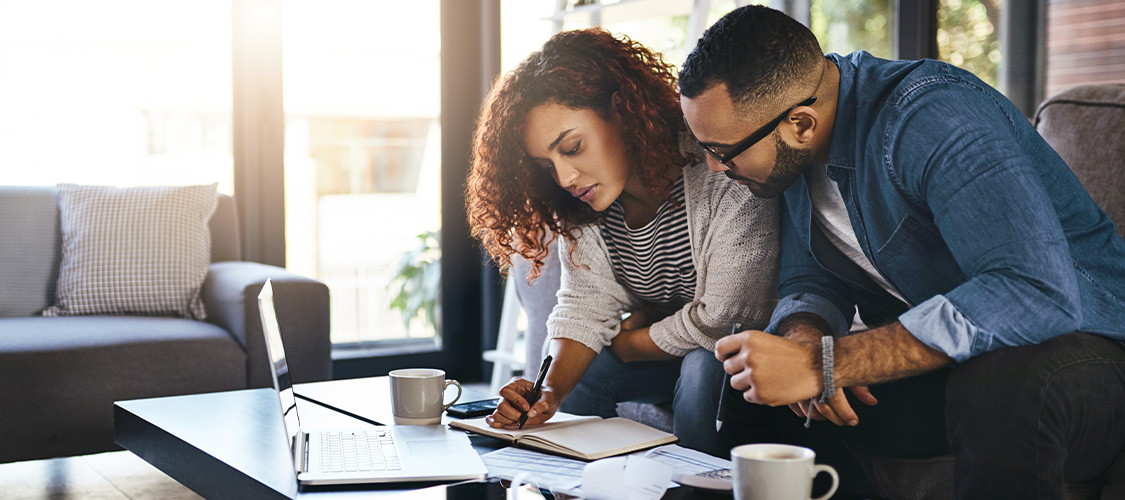Homebuyers
How Much Are Closing Costs?
August 14, 2025
There’s one question most homebuyers want answered right after their offer is accepted on a home: “How much are closing costs?”
For most buyers, closing costs typically range from 2% to 6% of the loan amount. On a $300,000 home with a $240,000 loan, that’s roughly $4,800 to $14,400 due at closing. These costs often cover lender fees, government charges, third-party services like appraisals and inspections, and optional expenses such as surveys.
However, knowing this range is just the starting point when it comes to closing costs.
“There is no rule of thumb as to how much since the fees and expenses associated to them can vary state to state, city to city, property type or loan type,” said Anthony Ramirez, a loan consultant with New American Funding based in San Diego, Calif.
Understanding when and how these fees are paid can help you plan for one of the most important milestones in the buying process.
After all, the day you close on a home can be one of the most exciting days of your life. The best way to ensure that you can start celebrating your new home without any last-minute glitches is to show up prepared.
Buyers are expected to arrive on closing day with cash to cover closing costs. Your closing costs are separate from your down payment. Don’t worry, we’ll cover everything you need to know.
What are closing costs?
The term “closing costs“ refers to a collection of fees covering various services and expenses needed to get your mortgage finalized.
“Closing cost comprises of two main components: non-recurring closing costs and recurring closing costs,” said Ramirez. “Non-recurring closing costs are the one-time fees you pay to facilitate a new mortgage. Recurring fees, such as interest or property taxes, are recurring expenses that will be paid into the future.”
On your journey to closing, you’ll require the help of a variety of vendors and service providers.
Some of your closing costs will go to these providers and a portion will be owed to your lender. Before closing, your lender will give you a legally required document called a Closing Disclosure that outlines the final amount needed to close.
Factors affecting how much closing costs are for buyers
How much are closing costs for buyers? As stated above, the average buyer will pay between 2% and 6% of the loan amount in closing costs. Generally, the biggest factor impacting closing costs is a home’s price.
However, some property-related expenses may be higher for people in areas with a higher cost of living compared to people in more affordable areas.
What’s included in closing costs?

Closing costs generally include lender fees (loan origination, underwriting, discount points), government fees (recording fees, property taxes, transfer taxes), third-party services (appraisals, inspections, title services, attorney fees), and optional costs (additional inspections, rate lock fees).
Your Closing Disclosure will list each charge in detail. This makes it the best place to answer, “how much are my closing costs and what’s in them?”
But in general, here’s a look at what influences closing costs for buyers.
Lender fees in your closing costs
Closing costs paid to the lender are based on how much you borrow instead of the total price of the home. That means that a larger down payment may reduce closing costs.
- Interest rate: Generally, interest rates only affect closing costs if you opt to purchase discount points offered by your lender as a way to reduce your rate.
- Discount points: Mortgage discount points allow buyers to pay lenders’ prepaid interest in exchange for a lower interest rate. When available, a point is generally equal to 1% of a loan’s value.
- Origination fee: This is a one-time charge for loan processing that is typically charged as a percentage of the borrower’s loan balance.
- Mortgage insurance: An upfront mortgage insurance premium (UFMIP) is a one-time fee due at closing for most Federal Housing Administration (FHA) buyers that totals 1.75% of a loan.
- Application fee: Charged by the lender to process your mortgage application.
- Loan origination: Fee for the lender’s work in preparing and processing your loan.
- Lender fees: Additional charges from the lender, such as underwriting or document preparation fees.
Government fees that impact how much your closing costs are
- Property taxes: Generally, a buyer will pay a prorated portion of the property tax bill at closing. The same setup often applies when a property is part of a homeowners association (HOA).
- Recording fee: Charged by the county to record your property deed and mortgage documents.
Third-party services included in closing costs
- Homeowner insurance: A portion of your annual homeowner insurance premium is typically collected by the lender at closing using escrow.
- Real estate agent fees: Historically, the home seller paid both the listing and buyer’s agent commissions—often around 2.5% to 3% of the home’s sale price for the buyer’s agent. In 2025, after changes stemming from the National Association of Realtors settlement, these fees are now negotiable and may be paid by either the buyer, the seller, or split between them, depending on the agreement.
- Home inspection costs: Home inspectors charge fees based on a property’s size and the type of inspection being performed. Most inspectors charge several hundred dollars for a standard report.
- Attorney fees: Your real estate attorney may play a big role in ensuring that you can show up on the closing day with all of the documents needed for a home loan. Fees vary based on the attorney, location, transaction specifics, and the services being provided. Note that not all states require real estate attorneys.
- Property appraisal: Independent valuation to confirm the property’s market value for the lender.
- Escrow: Service that holds and distributes funds for taxes, insurance, and closing costs.
- Title costs: Fees for researching the property’s history to ensure there are no ownership disputes.
- Title insurance: This policy that protects you and/or the lender from claims against your ownership.
- Flood certification: Determines whether the property is in a FEMA-designated flood zone.
- Survey fee: Cost of verifying property boundaries and easements.
Miscellaneous/Administrative Costs
- HOA fees: Prorated portion of homeowners association dues owed at closing.
- Courier fee: Delivery of important documents between parties during closing.
- Notary fee: Fee for an official witness to verify signatures on legal documents.
Optional costs that add to how much closing costs are
While not always necessary, some buyers opt to include optional services during the closing process for peace of mind or to fulfill lender requests. These extras can raise your total closing costs. The most common ones are:
- Additional specialized inspections (pest, mold, radon): These are targeted inspections beyond the standard home inspection, often requested when there are signs of damage or environmental risks.
- Extra appraisal reports: If the lender requires more than one appraisal—common in unique or luxury properties—each additional report adds to closing costs.
- Survey fees for boundary verification: A survey confirms property lines and easements, ensuring there are no disputes over land use or encroachments before you close.
How to calculate how much your closing costs will be
To get an estimate of what closing costs might look like for a specific property, start by determining your anticipated loan amount. If you’re planning to put down 20% on a $300,000 home, your loan total will be $240,000.
Next, it’s time to determine how much you’ll pay based on the fact that closing costs are 2% to 6% of a loan total in most cases. When determining closing costs on the lower side of the average, we can see that 2% of $240,000 is $4,800. When figuring out closing costs on the higher side of the average, 6% of $240,000 is $14,400.
This means that a typical homeowner putting down 20% on a $300,000 home can expect to pay between $4,800 and $14,400 in closing costs. If you’re in the process of deciding how much to put down for a down payment, using an affordability calculator may help you get an idea of how different factors can influence your monthly payment.
Who pays closing costs?

Both buyers and sellers pay closing costs. The average buyer will pay somewhere between 2% and 6% of a loan amount in closing costs. That works out to about 1.8% to 4% of a home’s actual purchase price for most buyers.
Can closing costs be waived or reduced?
Closing costs are rarely fully waived, but some fees can be reduced or transferred to the other party via negotiation. Certain lenders offer promotions that cover specific costs, and seller concessions can help offset expenses.
First-time buyer assistance programs may also help with part of the total.
How much are closing costs for sellers?
For sellers, closing costs are closer to 6% to 10% of a home’s sale price. The biggest closing costs for most sellers include prorated property taxes, lawyer fees, and real estate commissions.
In some cases, sellers will take on extra closing costs as part of seller concessions. A seller concession is a portion of a buyer’s closing costs or prepaid expenses that a seller agrees to finance to close.
This is more common in buyer-friendly markets because sellers might be eager to sell their homes. Sellers may also offer to pay some closing costs to help cover repairs or upgrades needed on the property. The purpose of a seller concession is to make a home more affordable for the buyer.
Negotiating closing costs as a buyer
It’s important to understand that who pays closing costs is not something you will negotiate directly with your lender. Instead, this is part of the negotiation process between buyers, sellers, and their agents.
Buyers can sometimes lower closing costs by requesting concessions. Although not guaranteed, this can be more feasible in markets with lower demand. A seller may also agree to finance a buyer’s mortgage points to help close the sale when a home requires updates or repairs.
While buyers usually aren’t asked to cover seller fees, a seller might ask a buyer to waive inspections in a competitive market.
First-time buyer tips for reducing closing costs

If you’re buying your first home, there are several smart strategies you can use to keep closing costs affordable without sacrificing essential services.
- Get at least three quotes for home inspections and other services to compare pricing.
- Ask your agent if seller concessions are possible in your market.
- Compare title company fees—these can vary more than many buyers realize.
- Check if your lender offers any first-time buyer programs that reduce fees.
The truth is that some closing fees are simply non-negotiable. However, you may be able to cut closing costs as a first-time homebuyer by shopping around for different service providers.
“It is recommended to sit down with a mortgage professional to help explain what the expenses are and how they were derived,” said Ramirez. “Since there are so many factors that can go into the expenses, they can help explain options or details that can effect the closing cost with a mortgage.”
Finally, remember that closing costs only represent one aspect of buying a home. Shopping around for different types of mortgages with a trusted lender can help you find the best way to get affordable monthly payments that make your goal of ownership a reality.
Anthony Ramirez NMLS # 249819






 Smart Moves Start Here.
Smart Moves Start Here.